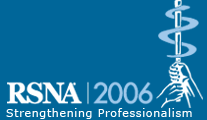
Abstract Archives of the RSNA, 2006
SSQ05-08
Noninvasive Estimation of Pulmonary Vascular Resistance (PVR) and Pulmonary Arterial Pressure (PAP) in Pulmonary Arterial Hypertension (PAH) by MRI
Scientific Papers
Presented on November 30, 2006
Presented as part of SSQ05: Chest (MR Imaging)
Christos Loupatatzis MD, Presenter: Nothing to Disclose
Claudia Tueller MD, Abstract Co-Author: Nothing to Disclose
Christoforos Stoupis MD, Abstract Co-Author: Nothing to Disclose
Thomas Geiser MD, Abstract Co-Author: Nothing to Disclose
Peter Vock MD, Abstract Co-Author: Nothing to Disclose
Laurent Nicod MD, Abstract Co-Author: Nothing to Disclose
To estimate non-invasively functional and prognostic
parameters of the pulmonary circulation in PAH by MRI
We report our initial experience of 9 patients (6 female, 3 male, median age 49 years, range 25-68) with PAH: median PVR was 826 dyne*s/cm5 (range 300-1403 dyne*s/cm5), median PAP was 51 mmHg (range 36-63 mmHg). All patients were studied by both right heart
catheterisation and MRI. MRI included morphologic imaging (HASTE dark blood), TRUFISP cine sequences, pulmonary flow quantification by phase contrast MRI, and 3D-MR contrast-enhanced angiography. The MRI results obtained by a blinded reader were correlated with cardiac output, PVR and mean PAP values obtained by invasive measurement.
Cardiac output, evaluated by MRI, correlated with the cardiac output assessed by right heart catheter: by pulmonary flow measurement (COPF) (r = 0.70) and by right ventricular volume measurement (CORV) (r = 0.95). Moreover, COPF correlated with PVR (r = 0.79) and with PAP (r = 0.81). CORV correlated with PVR (r = 0.85; CORV = -0.0032 PVR + 6.265) and with PAP (r = 0.71).
Non-invasive MRI estimation of PVR and PAP in patients with PAH is feasible. Two different and independent semi-quantitative MRI techniques correlate with clinically important prognostic parameters of
the pulmonary circulation; this may mean robustness of the MRI technique. Further consolidation of these results is needed.
MRI, if these results can be confirmed, might be superior to echocardiography in non-invasively estimating prognostic parameters of the pulmonary circulation in PAH.
Loupatatzis, C,
Tueller, C,
Stoupis, C,
Geiser, T,
Vock, P,
Nicod, L,
Noninvasive Estimation of Pulmonary Vascular Resistance (PVR) and Pulmonary Arterial Pressure (PAP) in Pulmonary Arterial Hypertension (PAH) by MRI. Radiological Society of North America 2006 Scientific Assembly and Annual Meeting, November 26 - December 1, 2006 ,Chicago IL.
http://archive.rsna.org/2006/4431082.html

